|
|
|
Sort Order |
|
|
|
Items / Page
|
|
|
|
|
|
|
| Srl | Item |
| 1 |
ID:
173909
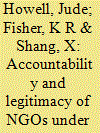

|
|
|
|
|
| Summary/Abstract |
How non-governmental organisations (NGOs) craft accountability and legitimacy in authoritarian states is poorly understood. We put forward a framework of analysis for capturing the processes of making accountability and legitimacy. We introduce the ideas of first- and second-order accountability and stocks of accountability capital. In authoritarian regimes, building second-order accountability through the accumulation of stocks of accountability is crucial for NGOs’ survival and organisational development and as a path towards gaining first-order accountability. Drawing on a decade of fieldwork on child welfare NGOs in China from 2007 to 2017, we select three case studies with long operational trajectories to illustrate processes of crafting legitimacy and accountability. The research contributes empirically and theoretically to the understanding of accountability in NGOs in authoritarian states through the novel analytic framework and case study of China.
|
|
|
|
|
|
|
|
|
|
|
|
|
|
|
|
| 2 |
ID:
090715
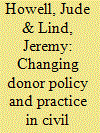

|
|
|
|
|
| Publication |
2009.
|
| Summary/Abstract |
This article argues that the global 'War on Terror' regime has contributed in complex and differentiated ways to the increasing securitisation of development policy and practice. The global 'War on Terror' regime refers to a complex and contradictory weaving of discourses, political alliances, policy and legislative changes, institutional arrangements and practices. This is manifest in aid rhetoric, policy discourse, institutional convergence and programming. These processes have in turn affected the way donor agencies engage with non-governmental actors. On the one hand they have led to new forms of control over charitable agencies; on the other hand they have created new opportunities for interaction and resource access to 'newly discovered' civil society actors such as Muslim organisations and communities. The article explores these issues through the lens of development policy and practice by four donor countries, namely, the USA, Sweden, the UK and Australia.
|
|
|
|
|
|
|
|
|
|
|
|
|
|
|
|
| 3 |
ID:
164412
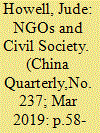

|
|
|
|
|
| Summary/Abstract |
Since 2015 rights-based NGOs, lawyers, feminists and journalists have endured the most stringent crackdown since 1989. Simultaneously the Xi Li administration has pushed forward a series of laws, policies and regulatory changes to enable service-oriented NGOs to apply for government contracts to provide welfare services. This seemingly Janus-like policy of welfarist incorporation can be traced back to the Hu–Wen period, often described as a lacklustre period, despite significant efforts to tackle issues of poverty and inequality. This article argues for a more balanced appraisal of this period by exploring in depth the complex politics underpinning efforts to pluralize welfare provision by involving service-oriented NGOs. It explores three sets of politics influencing this policy process: inter-institutional politics; state/non-state actor politics; and domestic/external politics. Furthermore, it considers processes of gradual institutional change adopted by key political actors to achieve these ends.
|
|
|
|
|
|
|
|
|
|
|
|
|
|
|
|
| 4 |
ID:
164409
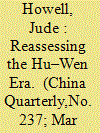

|
|
|
|
|
| Summary/Abstract |
The Hu–Wen era has been characterized as a “lost decade” for economic and political reform, but a “golden era” in terms of economic growth and political stability. Yet, relatively little attention has been paid to the social policies introduced during Hu and Wen's decade in power. These important policies, however, abolished agricultural taxes, extended health insurance, pensions and income support to almost all rural as well as urban residents, and built a civic welfare infrastructure to address migrants’ grievances. These policies, some of which were developed under the preceding Jiang Zemin and Zhu Rongji leadership, were introduced for a complex mix of reasons. Their aim was not only to reduce inequalities but also to stimulate domestic consumption and sustain economic growth, offset the effects of China's entry to the WTO and the global recession of 2008, and maintain social stability. They were the product of domestic bureaucratic politics and experimentation. They were also strongly influenced by China's integration into the international economy, as well as by international governmental and non-governmental organizations and the ideas they introduced into China's domestic policy networks. Although Hu–Wen era social policy reforms had only limited effects on reducing income inequality and involved complex politics, they did establish for the first time entitlements to social security and safety nets for all China's population.
|
|
|
|
|
|
|
|
|
|
|
|
|
|
|
|
| 5 |
ID:
052030
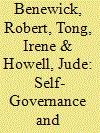

|
|
|
|
|
| Publication |
March 2004.
|
| Summary/Abstract |
This article has three objectives: 1) to assess the contribution of villager self-government to the development of community councils in urban China; 2) to discuss whether there are lessons to be learned from the experiments in urban community councils relevant to the building of rural communities; and 3) most importantly, to raise theoretical issues common to both villager self-government and urban community councils. In fulfilling these three aims, this article will further understanding of the expansion of grassroots democracy and increasing citizens' participation in China.
The article's comparative approach will incorporate an analysis of the institutionalization of the 'Four Democracies' at the village level and the extent to which they are also being implemented in the different and varying circumstances of the urban experiments and environments. We are interested in whether the villagers' committees and residents' committees, especially the latter in their restyled community status, are training grounds for citizenship. The different human landscapes of village and community, however, will have a profound effect on the nature and exercise of citizenship.
|
|
|
|
|
|
|
|
|
|
|
|
|
|
|
|
| 6 |
ID:
142571
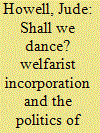

|
|
|
|
|
| Summary/Abstract |
Relations between the state and labour NGOs in China have been particularly fraught. In 2012, they took an interesting turn when some local governments made overtures to labour NGOs to cooperate in providing services to migrant workers. This article argues that this shift is part of a broader strategy of “welfarist incorporation” to redraw the social contract between state and labour. There are two key elements to this strategy: first, a relaxation of the registration regulations for social organizations, and second, governmental purchasing of services from social organizations. These overtures have both a state and market logic to maintain social control and stabilize relations of production.
|
|
|
|
|
|
|
|
|
|
|
|
|
|
|
|
|
|
|
|
|